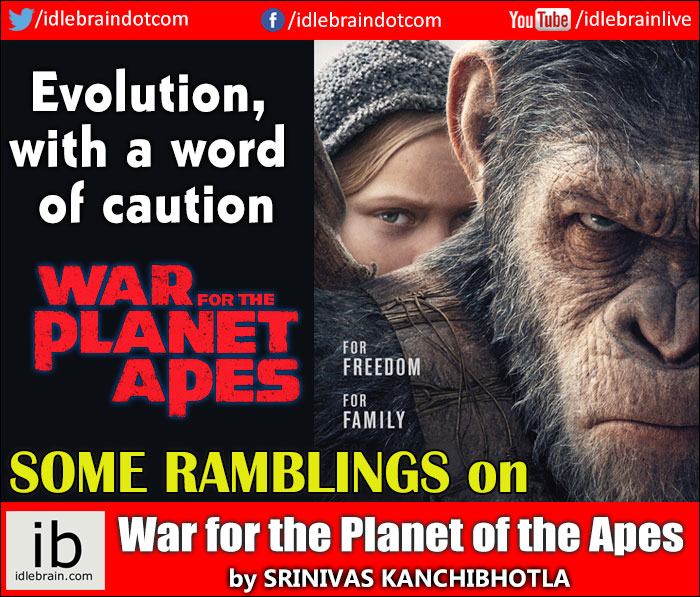
Someone once said that the whole of the creation, existence, evolution is one big allegory. As to what it is allegorical about is pretty subjective. Consider just a tiny slice in human history. That he evolved from a primate, developed skills and tools, got organized, established order and from thereon strove to retain and consolidate that power, in turn creating a lot of unrest, infighting and imbalance, eventually taking it all back to the times when he was still a primate fending for himself, is an allegory about the inherent nature of 'Nature', where ebb and flow, and rise and fall are built into the system, whereby no order can progress and prosper perpetually in time and that a kill switch comes baked with all systems, living or otherwise. It can also be an allegory about the cyclical structure of nature where over a period of time, history simply repeats itself, or as Mark Twain put it, it atleast rhymes. That's from the nature's stand point. Now pass the looking glass to humanity. It adjusted, adapted, evolved and propsered only to see it all razed to the ground (the fall of glorious civilizations and mighty empires attesting to that fact) only to start it all anew, is allegorical to how humanity merely changes shapes, it never truly evolves. Even the stories, myths and legends that it makes up to amuse and entertain itself carries the same strand of volatility and violent nature that can only spell doom to itself in the long run. A 'higher' man subjugates a weaker power, the 'lower' power slowly rebuilds and eventually rebels, ensuing and ongoing battle between the entitled and the empowered. Now subtitute the 'weaker power' with caste, region, religion, intelligence, financial might and any and all categories that humanity has found ways to divide itself, and the story plays out in pretty much the same way. Moving to the movies, make the 'lower power' machines, it becomes 'Terminator-2', make it 'indigenous people', there's 'Dancing with the wolves', 'Avatar', make it 'Apes', and it becomes the movie in question. When (hi)stories repeat, allegories become warning bells with the cautionary note, 'Ignore this at your own peril'.
The 'Apes' trilogy - starting out with an innoucuous teaching of the ape the greatest invention of humankind, language, causing it to quickly evolve (a la a human) before the powers that be realize the growing strength of its creation and rush in to pull the plug to no avail, and in the second (Frankenstein), the apes, now rich in communication, organization and self-defense asserting control over their domain and resisting all human effort to bring them back under their thumb (Terminator-2), and the pick of all, this third edition, the apes trying to branch out on their own in the tree of the mystical life - serves as a great reminder not just about the current geo-political climate in the world, where every other culture, religion and region is feuding with its neighbor asserting and protecting its identity, but also gives out a shoot to all the important turns that have coursed through human history thus far (slavery, civil rights, independence struggles et al). That it does all this with little dialogue and as little action as possible, specially in this third installment, is quite remarkable in its ambition of reaching for the stars and almost grasping them. Even more impressive is the feat that the trilogy has been conceived one part at a time and not as one single arc, and the writers (and director) continued from each logical conclusion at the end of each part to push the story further along the evolutionary ladder of the character, in this case, literally and figuratively. There has no been no other trilogy till date that was not based on previously published material which consistently outdid its predecessor with the breadth and depth of its ideas. These post-apocalyptic tales about humanity trying to rebuild itself, following a wipe out (from a virus, nuclear fall out, resource depletion etc), in the midst of the good and evil forces battling it out for future dominion, is an interesting study in pyschology, group behavior and chaos theory, while brutality and civility constantly see-saw on the sharp edge of the survival instinct.
'War for the planet of the apes' is an exercise of great discipline and self-restraint refusing to rely on the pyro-techniques (even when there is a lot of scope for them) and instead spending more time in silences and simple words to communicate its profoundness. Even the few action pieces in the movies are toned down and muted and played against dirge, as though indicating, when destruction is imminent, the choice of the weapons barely matter. The movie is as much about ideas as it is about jaw dropping special effects so seamlessly interwoven into the narrative that they rarely take the centerstage. And Andy Serkis, the stand-in for the main ape, whose (e)motion and performance capture lent this movie the much needed realism and gravitas, deserves recognition from the Academy on par with other actors in the category operating in flesh and blood. 'War for the planet of the apes' would go down as the rare moment in Hollywood history where a movie tried wrapping the entire evolutionary tale of humanity in an allegory populated by, quite ironically, the apes.
checkout http://kanchib.blogspot.com for Srinivas's Blog.
